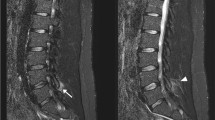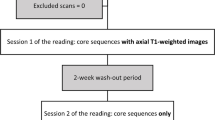Abstract
Purpose
The purpose of this study was to review the clinical features and diagnosis of spinal tuberculosis cases reported in the literature.
Methods
A medical literature search in the Medline Pubmed database was undertaken to review tuberculosis spinal infection and extra-pulmonary tuberculosis diagnosis improvement. We introduced the following search items and boolean operators: "spinal infection", "spinal tuberculosis infection", "microbiological diagnosis of spinal tuberculosis" and "spinal tuberculosis PCR." Single cases or series without microbiological diagnosis were rejected. Manuscript language was restricted to Spanish, French, and English versions.
Results and conclusions
Spinal tuberculosis is more common in developing countries and is probably underdiagnosed. Delayed diagnosis is characteristic; it worsens the prognosis and increases morbidity. The microbiological diagnosis is crucial for several reasons. Despite surgical treatment, medical treatment with anti-tuberculous drugs is always necessary. A total of 20–40% of the spinal tuberculosis patients show another locus of infection. Pulmonary location can become a public health problem. Previously treated patients for other tuberculosis locations, incomplete treatments, or poor adherence can change the M. tuberculosis sensitivity pattern. Drug resistance test becomes a major need in the microbiology laboratory. PCR diagnostic techniques advance the diagnosis and increase the sensitivity and specificity rate.
Similar content being viewed by others
References
Polley P, Dunn R (2009) Noncontiguous spinal tuberculosis: incidence and management. Eur Spine J 118:1096–1101
Cormican L, Hammal R, Messenger J, Milburn HJ (2006) Current difficulties in the diagnosis and management of spinal tuberculosis. Postgrad Med J 182:46–51
Milburn H (2007) Key issues in the diagnosis and management of tuberculosis. J R Soc Med 1100:134–141
Naim-ur-Rahman (1980) Atypical forms of spinal tuberculosis. J Bone Joint Surg Br 62-B(2):162–165
Bailey HL, Gabriel M, Hodgson AR, Shin JS (1972) Tuberculosis of the spine in children. J Bone Joint Surg Am 197254:1633–1657
Chen S-H, Lin W-C, Lee C-H, Chou Wen-Yi (2008) Spontaneous infective spondylitis and mycotic aneurysm: incidence, risk factors, outcome and management experience. Eur Spine J 117:438–444
Arora S, Kumar R (2011) Tubercular spinal epidural abscess involving the dorsal-lumbar-sacral region without osseous involvement. J Infect Dev Ctries 15(7):544–549
Agrawal VR, Patgaonkar P, Nagariya SP (2010) Tuberculosis of spine. J Craniovert Jun Spine 101:74–85
Beiner JM, Grauer J, Kwon BK, Vaccaro AR (2003) Postoperative wound infections of the spine. Neurosurg Focus 115(3):14
Oguz E et al (2008) A new classification and guide for surgical treatment of spinal tuberculosis. Int Orthop 132(127):133
Nair SS (2011) Ethical aspects of the Revised National Tuberculosis Control Programme. Indian J Med Ethics 8(2):102–106
Lee KY, Sohn SK, Hwang KS (1999) Comparison of pyogenic and tuberculous spondylitis. J Korean Soc Spine Surg 6(3):443–450
AlOthman A, Memish ZA, Awada A et al (2001) Tuberculous spondylitis: analysis of 69 cases from Saudi Arabia. Spine 26:565–570
Pintado-García V (2008) Espondilitis infecciosa. Enferm Infecc Microbiol Clin 226(8):510–517
Solís-García DP, Vives-Soto M, Lizán-García M, Martínez-Alfaro E, Segura-Luque JC, SoleraSantos J (2005) Incidencia de la espondilitis infecciosa en la provincia de Albacete. Enferm Infecc Microbiol Clin 123:545–550
Beronius M, Bergman B, Andersson R (2001) Vertebral osteomyelitis in Göteborg, Sweden: a retrospective study of patients during 1990–95. Scand J Infect Dis 133(7):527–532
Nagashima H, Yamane K, Nishi T, Nanjo Y, Teshima R (2010) Recent trends in spinal infections: retrospective analysis of patients treated during the past 50-years. Int Orthop 34(3):395–399
Weng CY, Chi CY, Shih PJ, Ho CM, Lin PC, Chou CH et al (2010) Spinal tuberculosis in non-HIV-infected patients: 10 year experience of a medical center in Central Taiwan. J Microbiol Immunol Infect 43(6):464–469
Kim CJ, Song KH, Jeon JH, Park WB, Park SW, Kim HB et al (2010) A comparative study of pyogenic and tuberculous spondylodiscitis. Spine 35(21)
Smith I (2003) Mycobacterium tuberculosis pathogenesis and molecular determinants of virulence. Clin Microbiol Rev 116:463–496
Taneja B, Mande SC (2001) Metal ions modulate the plastic nature of Mycobacterium tuberculosis chaperonin-10. Protein Eng 114:391–395
Cheng VCC, Yam WC, Hung IFN, Woo CY, Lau SKP, Tang BSF et al (2004) Clinical evaluation of the polymerase chain reaction for the rapid diagnosis of tuberculosis. J Clin Pathol 257:281–285
World Health Organization (2007) Global tuberculosis control. Surveillance, planning, financing. WHO, Geneva
Portillo L, Morris SL, Panduro A (2000) Rapid and efficient detection of extra-pulmonary Mycobacterium tuberculosis by PCR analysis. Int J Tuberc Lung Dis 4(4):361–370
Runa F, Yasmin M, Hoq MM, Begum J, Rahman AS, Ahsan CR (2001) Molecular versus conventional methods: Clinical evaluation of different methods for the diagnosis of tuberculosis in Bangladesh. J Microbiol Immunol Infect 1:101–105
Steingart K et al. (2011) Commercial serological tests for the diagnosis of active pulmonary and extrapulmonary tuberculosis: an updated systematic review and meta-analysis. www.plosmedicine.org/article/info%3Adoi%2F10.1371%2Fjournal.pmed.1001062. Accessed 02 January 2012
Collins I, Wilson-MacDonald J, Chami G, Will Burgoyne P, Vineyakam TB et al (2008) The diagnosis and management of infection following instrumented spinal fusion. Eur Spine J 117:445–450
Pertuiset E, Beaudreuil J, Lioté F et al. (1999) Spinal tuberculosis in adults. A study of 103 cases in a developed country, 1980–1994. Medicine (Baltimore) 178(5):309–320
Boondireke S, Mungthin M, Tan-ariya P, Boonyongsunchai P, Naaglor T et al (2010) Evaluation of sensitivity of multiplex PCR for detection of Mycobacterium tuberculosis and Pneumocystis jirovecii in clinical samples. J Clin Microbiol 148(9):3165–3168
Amin I, Idrees M, Awan Z, Shahid M, Afzal S, Hussain A (2011) PCR could be a method of choice for identification of both pulmonary and extra-pulmonary tuberculosis. BMC Res Notes 4(1):332
Colmenero JD, Morata P, Ruiz-Mesa JD, Bautista D, Bermúdez P, Bravo MJ et al (2010) Multiplex real-time polymerase chain reaction: a practical approach for rapid diagnosis of tuberculous and Brucellar vertebral osteomyelitis. Spine 35(24)
Queipo-Ortuño MI, Colmenero JD, Bermúdez JD, Bravo MJ, Morata P (2009) Rapid differential diagnosis between extrapulmonary tuberculosis and focal complications of Brucellosis using a multiplex real-time PCR assay. PLoS One 14(2):e4526
Kalita J, Misra UK, Mandal SK, Srivastava M (2005) Prognosis of conservatively treated patients with Pott’s paraplegia: logistic regression analysis. J Neurol Neurosurg Psychiatry 176:866–868
Medical Research Council Working Party on Tuberculosis of the Spine (1993) Controled trial of short-course regimens of chemotherapy in the ambulatory treatment of spinal tuberculosis. J Bone Joint Surg Br 175:240–248
Author information
Authors and Affiliations
Corresponding author
Rights and permissions
About this article
Cite this article
Merino, P., Candel, F.J., Gestoso, I. et al. Microbiological diagnosis of spinal tuberculosis. International Orthopaedics (SICOT) 36, 233–238 (2012). https://doi.org/10.1007/s00264-011-1461-x
Received:
Accepted:
Published:
Issue Date:
DOI: https://doi.org/10.1007/s00264-011-1461-x




